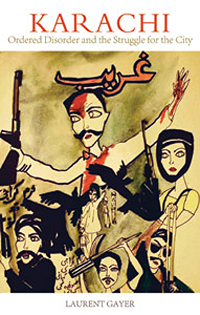Karachi Ordered Disorder and the Struggle for the City
Material type: TextLanguage: English Publication details: London : C.Hurst & Co., c2014Description: xxv, 336 p. : illISBN:
TextLanguage: English Publication details: London : C.Hurst & Co., c2014Description: xxv, 336 p. : illISBN: - 9781849043113
- 954.9183 GAY
| Item type | Current library | Shelving location | Call number | Status | Date due | Barcode |
|---|---|---|---|---|---|---|
| Rent (Rs. 400) | Book Bank | Book Bank | 954.9183GAY | Available | B52730 | |
| Rent (Rs. 400) | Book Bank | Book Bank | 954.9183GAY | Available | B52731 | |
| Rent (Rs. 400) | Book Bank | Book Bank | 954.9183GAY | Available | B52729 |
Laurent Gayer
Laurent Gayer is a Research Fellow at the Centre national de la recherche scientifique (CNRS), currently posted at the Centre de sciences humaines (CSH), Delhi. He is also Research Associate at the Centre d’Etudes de l’Inde et de l’Asie du Sud, Paris
Summary
With an official population approaching fifteen million, Karachi is one of the largest cities in the world. It is also the most violent. Since the mid-1980s, it has endured endemic political conflict and criminal violence, which revolve around control of the city and its resources (votes, land and bhatta—‘protection’ money). These struggles for the city have become ethnicised. Karachi, often referred to as a ‘Pakistan in miniature,’ has become increasingly fragmented, socially as well as territorially.
Despite this chronic state of urban political warfare, Karachi is the cornerstone of the economy of Pakistan. Gayer’s book is an attempt to elucidate this conundrum. Against journalistic accounts describing Karachi as chaotic and ungovernable, he argues that there is indeed order of a kind in the city’s permanent civil war. Far from being entropic, Karachi’s polity is predicated upon organisational, interpretative and pragmatic routines that have made violence ‘manageable’ for its populations. Whether such ‘ordered disorder’ is viable in the long term remains to be seen, but for now Karachi works despite—and sometimes through—violence.
